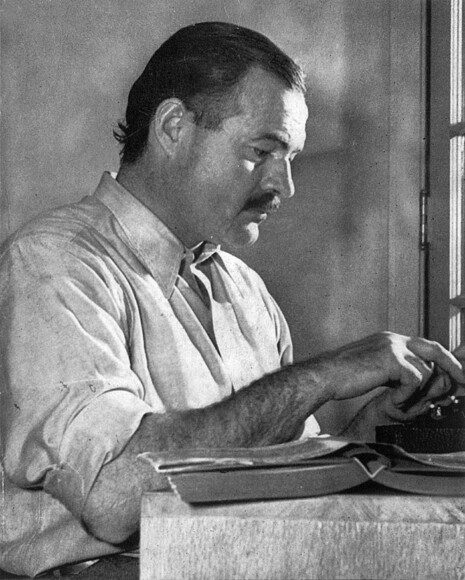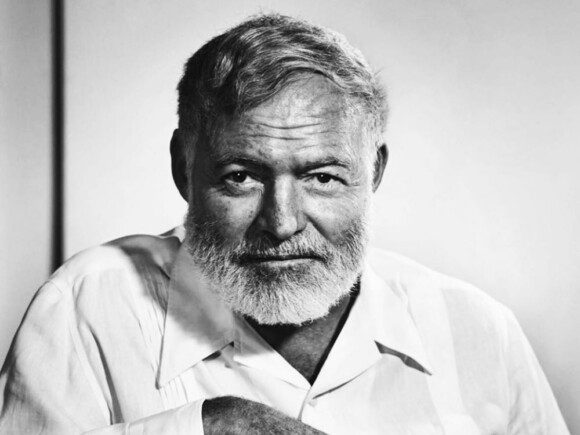 If you are reading this blog, I assume that in addition to enjoying my stories, you have at least an interest in cultivating an appreciation for good books. Some of my readers are old book hounds. They could definitely wax rhapsodic much better than I will be able to below. And I am thankful to have them reading. But my heart is for those who want more and don’t know where to start.
If you are reading this blog, I assume that in addition to enjoying my stories, you have at least an interest in cultivating an appreciation for good books. Some of my readers are old book hounds. They could definitely wax rhapsodic much better than I will be able to below. And I am thankful to have them reading. But my heart is for those who want more and don’t know where to start.
Maybe you read some Ernest Hemingway (E.H.) in school, but you dont remember it. And now, with a wistful glance, you stand looking into the window from outside wishing you could be a part of the discussion. And this thing that so many others seem to know about – what is it they’ve found? Why do they talk about it with such fervor? You’re tired of being left out.
Maybe, at this very moment, you are thinking to yourself, “I should read ‘A Farewell to Arms‘.” But you have a little trepidation because – what if you dont get it? What if you find it boring? Will you be left reading Nicholas Sparks forever?
Dear friend. There are no vampires in this book. Sex? Yes, it happens, but it is mainly behind the scenes. And no blindfolds or handcuffs are involved. There are no hobbits, no alternate dimensions, no tortured adolescents struggling with same-sex feelings needing to break out of their Nebraska farm home to find a community of like-minded friends in the big city. What lies within is one cobblestone in the road to intellectual maturity.
So. I just finished readying A Farewell To Arms. Actually, I listened to it on audiobook because it was the book I chose to listen to while driving on trips and while running on the treadmill at the gym.
Also remember. I was not an English major, and at this time I have read no supplementary articles that would tell me how to approach the book. I may get to those later. I have read several other Hemingway books and I know the basic deal on EH. But I consider myself an amateur.
 Here’s what I saw.
Here’s what I saw.
1) The book does not stand on the strength of the plot. Probably that is by design because I don’t think EH is trying to blow you away with an amazing new plot idea, like The Lord of the Rings.
2) One thing that is amazing about the book is how vivid everything is. And even more amazing is that he makes it vivid using his famously terse style:
I entered the cafe. It was warm. I ordered a ham sandwich and coffee. When the waitress returned, I asked her for my check. Sea birds were flying over the pier and the sun was bright in the blue sky.
And so on. He never uses any adjective except the most rudimentary. Blue. Never ‘cyan’ or ‘teal’. In his dialogue, he is completely photographically real.
“Do you love me, darling?”
“You know I do.”
“Say it again. I so love to hear you say it.”
“I love you with all my heart.”
“You’re so wonderful, darling. And I’m such a pest for asking.”
“Don’t say that. I don’t mind saying it again.”
“You really love me?”
“Of course.”
“Even with the baby starting to show?”
“I like your belly.”
“Perhaps I will get my hair cut after the baby comes.”
“I think its beautiful now.”
“You don’t want me to get it cut?”
“You can do whatever you like.”
“Would you love me more if I got it cut?”
“I love you no matter what.”
“Do you really?”
“Really.”
“Really?”
“Yes, really.”
“You can’t possibly.”
“But I do.”
“Really?”
“Really.”
“Are you sure?”
“Yes. I’m sure.”
“Even if I got my haircut?”
“Yes. Even if you got your haircut.”
“Oh darling. I’m such a child, aren’t I. Putting you through all this.”
And so on. (This is taken from memory, not directly from the story.) It reads differently than other books because it is 100% authentic, unscripted. By the end, you might not remember the plot, but you feel like you know exactly the nature of their relationship and the personalities of the two main characters. And, you believe every word they say.
3) It is totally devoid of Hollywood predictability. When they are hiding from the Italian army and paddling in a boat up the river to Switzerland, a reader today will feel and even expect that they are about to get caught. Stories always go that way, you say. Otherwise, you’re thinking, why would the author set up this suspenseful situation? But they don’t get caught. Even when they see an Italian boat nearby. You are tempted to think it was pointless to include such detail. Pointless? No, it was to to bless you, reader, to bless you. It was to give you a powerful new literary experience – to bring you into the very moment.
When Henry goes back into the battle and leaves Catherine at the hospital, you are sure their love will be thwarted, but it isn’t. They meet again and have a wonderful love affair. There are no shifty-eyed traitors, no men in capes twirling their mustaches. All the story-telling crutches we are used to are not there. The effect of this is that you cannot predict what will happen. It actually left me feeling a little bit unmoored – a wonderful feeling. Like, “he’s not following the rules here.” Except for the rules of life. Things happen just as they would in real life. There is not a single moment where the story is forced.
So, I’m seeing that when you encounter EH and specifically this book, you are not carried away by a wild plot or exotic setting or larger-than-life characters. You are captivated (if you can allow yourself to be, if you can be self-aware while reading) by the writer and what he’s doing to you, taking you to Italy and Switzerland, meeting many interesting, everyday people during WWI, making you smell and taste and see with almost no adjectives except the most common: The houses were white. The sea was blue with white caps. Her hair was brown. The wind blew. We walked on the rocky surface. And so on.
You’re thinking, “How can I be so present with the characters in this book? And he didn’t even use words like ‘devilishly’ or ‘ochre’.”
This is the pathway to intellectual maturity. Once we gain an appetite for something more than a happy ending, a beautiful girl and a handsome guy, a standard conflict and clever resolution, then we can enter a new era. If all you want to eat is pizza and hamburgers and Dr. Pepper, your taste is immature. A point comes where you realize you like sauteed mushrooms and asparagus and steak and red wine and hummus.
The same path awaits in literature.






